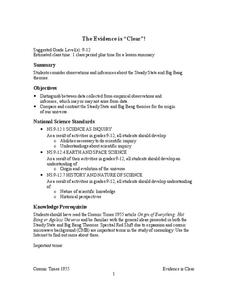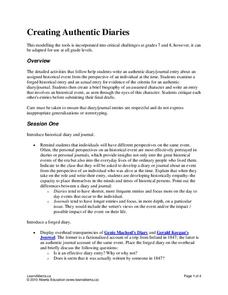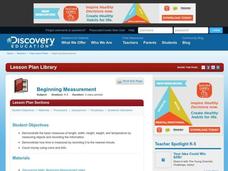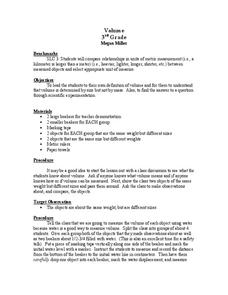Illustrative Mathematics
Longer and Heavier? Shorter and Heavier?
For many young children it seems obvious that longer objects are heavier than shorter objects. This assumption is put to the test as the class investigates the relationship between length and weight in a whole-group activity. Using a...
Houghton Mifflin Harcourt
That’s Amazing!: Extra Support Lessons (Theme 3)
Follow a teach, practice, and apply routine to provide extra support with a themed unit created by Houghton Mifflin. Topics include compound words, noting details, action verbs, suffixes, compare, and contrast, verbs, fantasy, realism,...
NASA
The Evidence is “Clear”!
Do you think you know better? Become a scientist and prove it. Scholars review the evidence for two different theories of the origins of the universe. They notice the empirical observations as well as the inferences to determine which is...
Alberta Learning
Creating Authentic Diaries
Napoleon Bonaparte once said, "What is history but a fable agreed upon?" A series of lessons encourages learners to look beyond the basic fable agreed upon related to events in history and consider multiple accounts of the event. The...
Curated OER
Abolitionists in U.S. History
Young scholars read and discuss excerpts from the writings of Henry David Thoreau, Frederick Douglass and Sarah Parker Redmond. They compare and contrast the views of the three abolitionists concentrating on the experiences and reasons...
Curated OER
Piglets
Students are asked have they ever seen a pig? They are asked what are young pigs called? Students are given the Pigs Display Sheet. They see that on the sheet there are two piglets and their mother. Students are told that mother pigs are...
Curated OER
Discovering Math: Beginning Measurement
Young mathematicians are shown a ruler, yardstick, tape measure and scale. They practice measuring length, width, height, and weight. They are then shown a thermometer, and discuss what a thermometer is used for. Everyone is shown how to...
Curated OER
Measure
Students are asked what activities or things that they do each day. They are then asked do you do that in the morning, afternoon, or night? Students are then asked which of those things do you do first, second, third, and etc.
Curated OER
Volume
Third graders complete scientific investigation to determine what volume is and how it is determined by size not by mass. They discuss what they know about volume before proceeding with the demonstration and experimentation. After the...
Curated OER
From Genomes of Species
High schoolers investigate genomic research being done and its potential for understanding, treating, and possibly curing human genetic conditions. The potential of proteomic research as a companion to the work being done with genomics...











